
Find Help
More Items From Ergsy search
-

What is HIV / AIDS?
Relevance: 100%
-
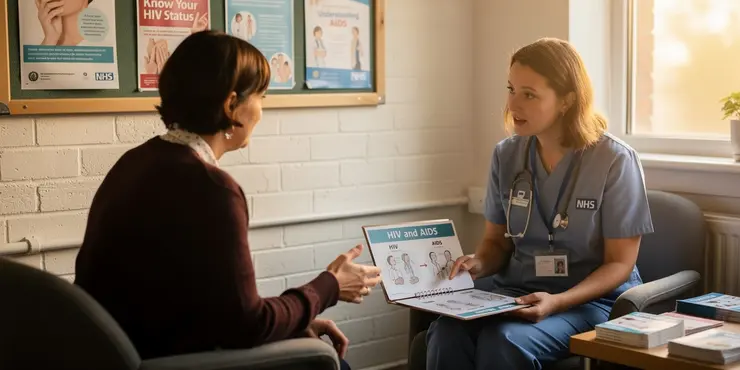
What is the difference between HIV and AIDS?
Relevance: 94%
-
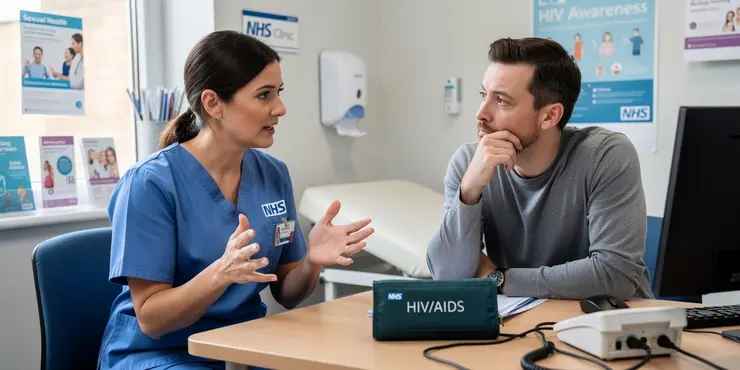
What is AIDS?
Relevance: 73%
-
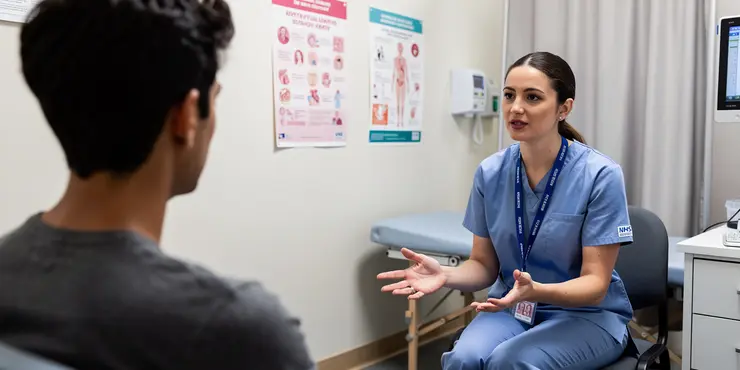
What is HIV?
Relevance: 72%
-

HIV and pregnancy | NHS
Relevance: 67%
-
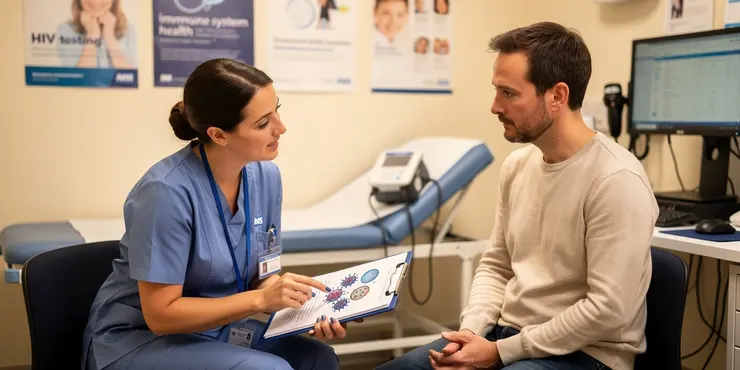
How does HIV affect the immune system?
Relevance: 64%
-
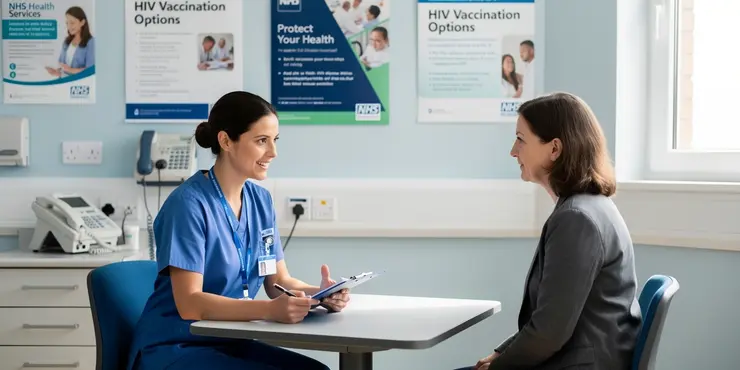
Are there vaccines available for HIV?
Relevance: 64%
-

How is HIV diagnosed?
Relevance: 61%
-

How is HIV transmitted?
Relevance: 61%
-

Sexual Health - HIV Testing
Relevance: 61%
-

How can HIV be prevented?
Relevance: 59%
-

HIV - My Story - Florence | NHS
Relevance: 58%
-

Can people with HIV lead normal lives?
Relevance: 58%
-

Is HIV only a concern for certain groups of people?
Relevance: 58%
-

Can HIV be transmitted through insect bites?
Relevance: 58%
-
Can HIV be transmitted through blood transfusions?
Relevance: 54%
-
What role does stigma play in the HIV epidemic?
Relevance: 52%
-

Is it safe for a partner of someone with HIV to have children?
Relevance: 52%
-
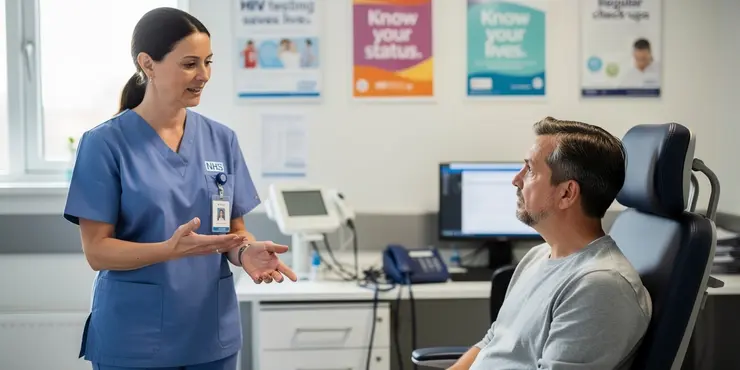
How often should someone get tested for HIV?
Relevance: 51%
-

What are the symptoms of HIV?
Relevance: 50%
-
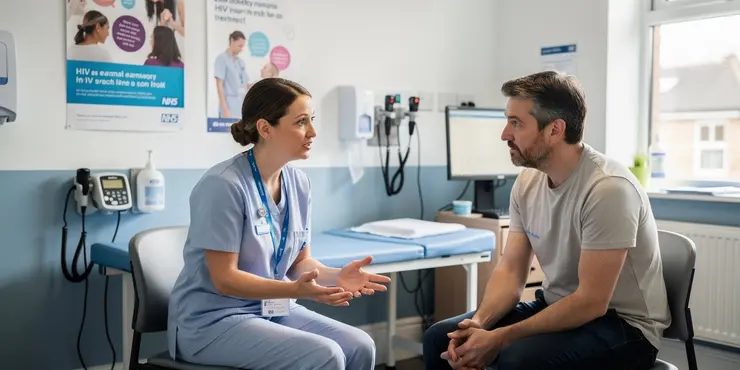
Can HIV be cured?
Relevance: 48%
-

Are there first aid courses for pets?
Relevance: 38%
-
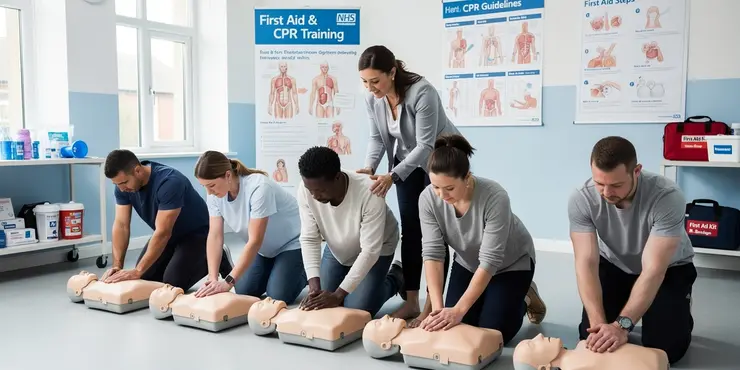
Do first aid certifications expire?
Relevance: 38%
-
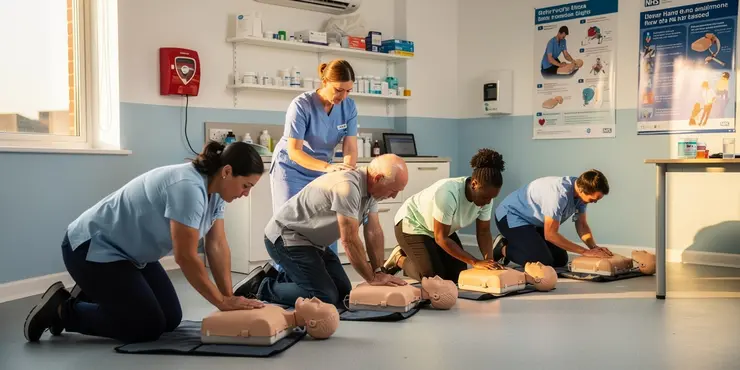
Where can I learn First Aid?
Relevance: 37%
-

How to remove your hearing aid
Relevance: 37%
-

Are there mobile apps that teach first aid?
Relevance: 37%
-
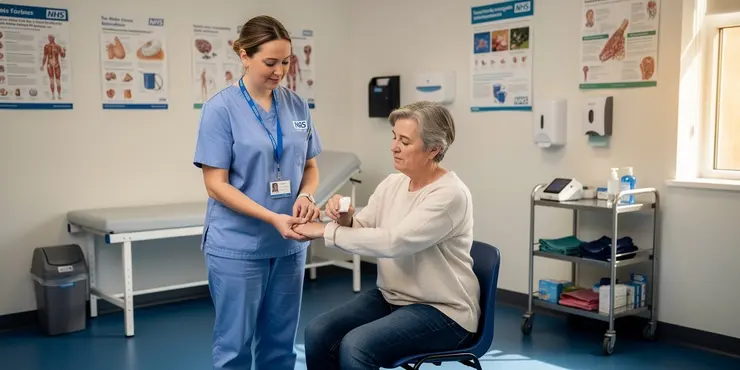
Are there free resources for learning first aid?
Relevance: 37%
-

How to insert your hearing aid
Relevance: 37%
-
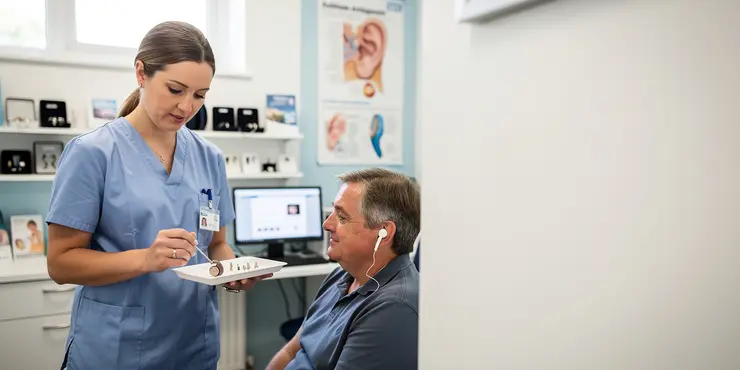
How to clean your hearing aid
Relevance: 37%
-

Are there financial aids available for further education?
Relevance: 37%
-
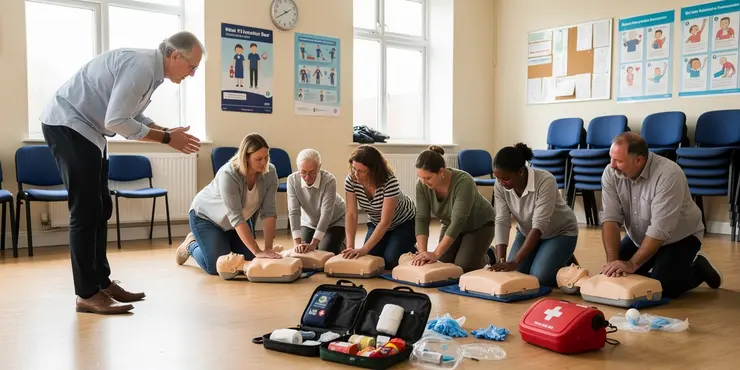
Can I learn first aid as a group?
Relevance: 37%
-

How significant is the reduction in funding for AIDS, Tuberculosis, and Malaria research?
Relevance: 35%
-

How to turn your hearing aids on and off
Relevance: 35%
-

What is the best first aid certification to obtain?
Relevance: 35%
-

Showing you around your hearing aid
Relevance: 35%
-

Where can I learn first aid online?
Relevance: 35%
-
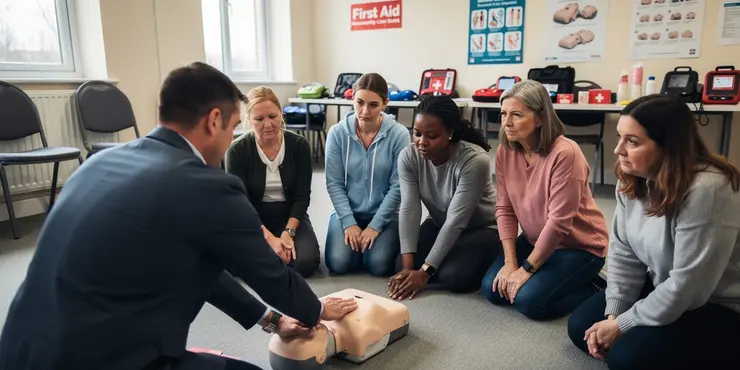
Can I take first aid courses in person?
Relevance: 35%
-

How to change your hearing aid battery
Relevance: 35%
-
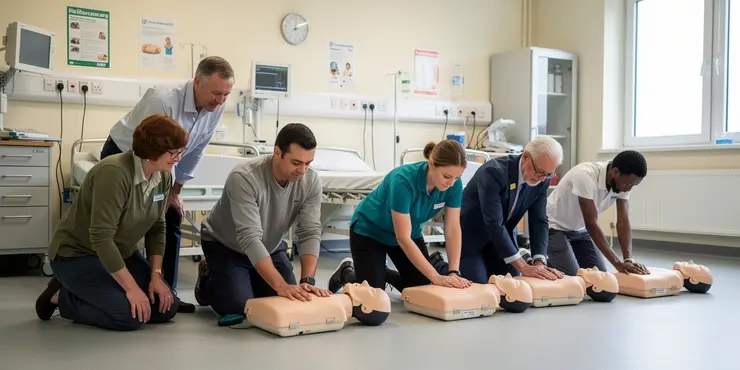
What topics are covered in a first aid course?
Relevance: 35%
-
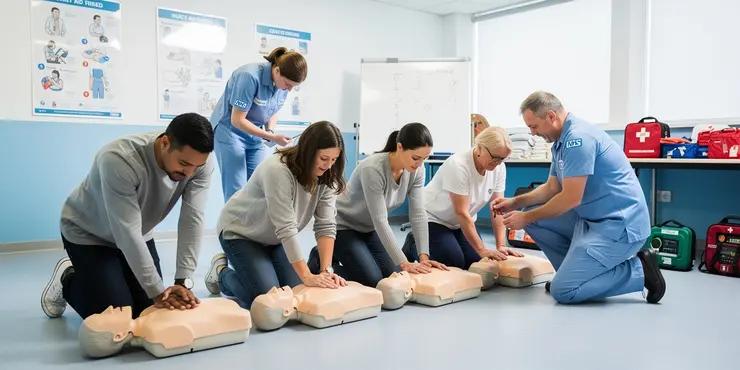
Do I need to bring anything to a first aid course?
Relevance: 34%
Understanding HIV and AIDS
HIV, or Human Immunodeficiency Virus, is a virus that attacks the body's immune system. If HIV is not treated, it can lead to AIDS (Acquired Immunodeficiency Syndrome). Unlike some other viruses, the human body cannot get rid of HIV completely, so once someone has HIV, they have it for life. However, with proper medical care, HIV can be controlled.
How HIV is Transmitted
HIV is spread by certain body fluids such as blood, semen, vaginal and rectal fluids, and breast milk from a person who has HIV. In the UK, the most common way HIV is transmitted is through unprotected sex with someone who has the virus. It can also be spread by sharing needles or syringes used for injecting drugs. It is important to note that HIV cannot be spread through casual contact like hugging or shaking hands.
Symptoms of HIV
Some people experience flu-like symptoms within 2-4 weeks after infection, which is the body’s natural response to the virus. This condition, known as acute retroviral syndrome (ARS), is the primary stage of infection. However, some people may not feel sick during this stage. The only way to know for sure if you have HIV is to get tested. Symptoms may not appear for several years, and during this time, the virus gradually weakens the immune system.
What is AIDS?
AIDS is the final stage of HIV infection, and not everyone who has HIV will develop AIDS. AIDS occurs when the body’s immune system is badly damaged because of the virus. When a person has AIDS, they are at greater risk of severe illnesses, known as opportunistic infections. With the today’s HIV treatments, most people with HIV in the UK will not develop AIDS if they take their medication as prescribed.
Treatment and Prevention
While there is currently no cure for HIV, it can be controlled with proper medical care known as antiretroviral therapy (ART). ART helps reduce the viral load in the body, keeping the immune system functioning and preventing progression to AIDS. It is important for people with HIV to adhere to their treatment plans to maintain their health. Prevention methods include using condoms during sex, pre-exposure prophylaxis (PrEP), and getting tested regularly. Early detection through testing and treatment are crucial for controlling the virus and preventing its spread.
Living with HIV
People living with HIV can lead long and healthy lives. Support and education are essential for managing the disease and reducing stigma associated with it. Accessing regular healthcare, taking medications consistently, and maintaining a healthy lifestyle can help those with HIV to live positively.
Understanding HIV and AIDS
HIV is a virus. It attacks the body's defense system. If not treated, HIV can turn into AIDS. The body cannot get rid of HIV completely, so once someone has it, they have it for life. But with the right care, HIV can be managed.
How HIV is Transmitted
HIV spreads through certain body fluids like blood and breast milk from someone who has HIV. In the UK, it mostly spreads through unprotected sex with someone who has the virus. It can also spread by sharing needles. HIV does not spread by hugging or shaking hands.
Symptoms of HIV
Some people get flu-like symptoms 2-4 weeks after they get the virus. This is the body’s natural reaction. This stage is called acute retroviral syndrome. Some people may not feel sick at this time. The only way to know if you have HIV is to get tested. Symptoms might not show for years, but the virus slowly weakens the body’s defense system.
What is AIDS?
AIDS is the last stage of HIV. Not everyone with HIV will get AIDS. AIDS happens when the body’s defense system is very damaged. People with AIDS can get very sick from other illnesses. With today’s treatments, most people with HIV in the UK will not get AIDS if they take their medication properly.
Treatment and Prevention
There is no cure for HIV, but it can be controlled with medical care called antiretroviral therapy (ART). ART lowers the amount of virus in the body and helps keep the body’s defense system strong. It's important for people with HIV to follow their treatment plans. To prevent HIV, use condoms, consider pre-exposure prophylaxis (PrEP), and get tested often. Finding out early and getting treatment are important to control the virus.
Living with HIV
People with HIV can live long, healthy lives. Support and learning about the disease can help manage it and reduce negative feelings about it. Going to the doctor regularly, taking medicine on time, and living a healthy life can help people with HIV live well.
Frequently Asked Questions
What is HIV?
HIV (Human Immunodeficiency Virus) is a virus that attacks the body's immune system, specifically the CD4 cells (T cells), which can lead to AIDS if not treated.
What is AIDS?
AIDS (Acquired Immunodeficiency Syndrome) is the most severe phase of HIV infection, occurring when the immune system is badly damaged and you become vulnerable to opportunistic infections.
How is HIV transmitted?
HIV is mainly transmitted through unprotected sexual contact, sharing needles, and from mother to child during childbirth or breastfeeding. It can also be spread through blood transfusions with infected blood, although this is rare.
Can HIV be cured?
There is currently no cure for HIV. However, with proper medical care, HIV can be controlled and individuals can live long, healthy lives.
What are the symptoms of HIV?
Some people may experience flu-like symptoms within 2 to 4 weeks after infection, while others may not show symptoms for years. Common symptoms include fever, sore throat, and fatigue.
How does HIV affect the immune system?
HIV targets and destroys CD4 cells, which are crucial for the immune system to function properly, thereby weakening the body’s ability to fight infections and diseases.
How is HIV diagnosed?
HIV is diagnosed through blood tests that detect the virus or the antibodies the body makes against it.
How can HIV be prevented?
HIV can be prevented through safe sex practices, not sharing needles, and taking preventive medications like PrEP. Pregnant women with HIV can take medication to reduce the risk of transmitting the virus to their babies.
What is antiretroviral therapy (ART)?
ART is a combination of HIV medicines taken daily that helps control the virus and improve quality of life for people with HIV.
What is the difference between HIV and AIDS?
HIV is the virus that causes infection; AIDS is the condition that can develop over time when the virus has significantly weakened the immune system.
Can people with HIV lead normal lives?
Yes, with effective treatment, people with HIV can live healthy lives with a near-normal life expectancy.
Is HIV only a concern for certain groups of people?
No, HIV can affect anyone regardless of age, gender, sexual orientation, or race. Anyone who practices risky behavior is at risk.
How often should someone get tested for HIV?
The CDC recommends that everyone between the ages of 13 and 64 get tested for HIV at least once as part of routine health care. Those at higher risk should be tested more frequently.
Can HIV be transmitted through casual contact?
No, HIV cannot be spread through casual contact such as hugging, shaking hands, or through saliva, water, or air.
What does an undetectable viral load mean?
An undetectable viral load means that the level of HIV in the blood is so low it can't be detected by standard tests. This significantly reduces the risk of transmitting the virus.
What are opportunistic infections?
Opportunistic infections are illnesses that occur more frequently and are more severe in individuals with weakened immune systems, including those with AIDS.
What role does stigma play in the HIV epidemic?
Stigma and discrimination can affect the mental health of people living with HIV and discourage them from seeking testing, treatment, and support.
Are there vaccines available for HIV?
No, there is currently no vaccine available to prevent HIV, though research is ongoing.
Can HIV be transmitted through insect bites?
No, HIV cannot be transmitted through insect bites. The virus does not live in insects.
Is it safe for a partner of someone with HIV to have children?
Yes, with proper medical intervention and treatment, people with HIV can have children without transmitting the virus to their partner or child.
What is HIV?
HIV is a virus.
It can make people sick.
HIV stands for Human Immunodeficiency Virus.
It hurts the body's defense system, called the immune system.
Tools that can help you understand more:
- Look at pictures or videos to learn.
- Ask a teacher or a friend for help.
- Use easy language books about HIV.
HIV is a virus. It attacks the body's defense system. This defense system is called the immune system. HIV goes after special cells in your body called CD4 cells, or T cells. If you do not treat it, it can cause a big health problem called AIDS.
What is AIDS?
AIDS is a sickness. It makes it hard for the body to fight germs.
If someone has AIDS, special germs can make them very sick.
People get AIDS from a virus called HIV. This virus hurts the body.
Doctors can help people with AIDS feel better. Medicine is important.
For help, people can talk to a doctor, a nurse, or look for support groups.
AIDS is the last and most serious stage of an illness called HIV. When someone has AIDS, their body's defenses can't fight off germs well. This can make them get very sick from other illnesses.
How do you get HIV?
HIV can spread from one person to another. Here's how:
- Blood: If HIV-infected blood goes into another person's body.
- Sex: By having unprotected sex (sex without a condom) with someone who has HIV.
- Sharing Needles: Using the same needle as someone who has HIV.
- Pregnancy: A mom with HIV can give it to her baby during pregnancy, birth, or breastfeeding.
Remember:
- Condoms: Use condoms during sex to stay safe.
- Don't Share Needles: Always use clean needles.
- Get Tested: Regularly check if you have HIV, especially if you think you might be at risk.
If you have questions, ask a doctor or a health worker. They are there to help you.
HIV is a virus that can spread in several ways:
- Having sex without a condom.
- Sharing needles with other people.
- A mom can pass it to her baby during birth or breastfeeding.
- Getting blood from someone who has the virus, but this doesn’t happen often now.
If you want to learn more or need help, ask a doctor or look for safe information online. There are also apps that can read texts out loud and help understand better.
Can HIV be cured?
No, there is no cure for HIV right now. But using medicine can help people with HIV live a long and healthy life. It's important to take the medicine every day.
If you have questions, talking to a doctor can help. They can tell you more about HIV and how to stay healthy. Having support from friends or family can help too.
There is no cure for HIV right now. But doctors can help people with HIV feel better and live for a long time with medicine and good care.
What happens if someone has HIV?
If a person has HIV, they might feel sick. Here are some signs:
- They feel very tired.
- They have a fever or sweat at night.
- They lose weight without trying.
- They have swollen glands.
- They might have a sore throat or a rash.
If you think you or someone you know might have HIV, it's important to see a doctor. They can help. Talking to someone you trust can also be helpful.
Some people can feel sick like the flu 2 to 4 weeks after they get infected. Other people might not feel sick for many years.
Common signs that you could be sick are a fever, a sore throat, and feeling very tired.
If you have trouble understanding, try using pictures or ask someone to help explain. You can also use tools that read text out loud.
What does HIV do to the body's defense system?
HIV is a virus that can make the body's defense system weak.
The body's defense system helps fight germs and keep us healthy. But HIV can hurt this system. This makes it hard for the body to fight off other germs.
HIV attacks special cells in the body called T-cells or CD4 cells. These cells help protect us from getting sick. When HIV hurts these cells, the body can't fight germs as well.
To make reading easier, you can ask someone for help, use audiobooks, or try reading apps. These tools can help you understand better.
HIV is a type of virus that attacks something called CD4 cells. These cells are very important because they help our bodies fight off germs and illnesses. When HIV hurts these cells, our bodies have a harder time staying healthy and can get sick more easily.
How do doctors find out if someone has HIV?
You can find out if someone has HIV by taking a blood test. This test looks for the virus in the blood or checks if the body is making special proteins to fight the virus.
How can you stop HIV?
You can stop HIV from spreading by having safe sex, not sharing needles, and taking special medicine called PrEP. Pregnant women who have HIV can take medicine to help make sure their babies don't get the virus.
What is antiretroviral therapy (ART)?
Antiretroviral therapy, or ART, is a medicine for people with HIV. It helps them stay healthy.
If you have HIV, ART can stop the virus from growing. This means you can feel better and live a longer life.
Helpful Tips:
- Take your medicine every day as the doctor says.
- Use a pill box to remember your daily doses.
- Talk to a doctor or nurse if you have questions.
ART is medicine that people with HIV take every day. It helps them feel better and stay healthy.
How are HIV and AIDS different?
HIV is a virus that can make people sick. It stands for Human Immunodeficiency Virus.
AIDS is a disease that can happen if someone has HIV for a long time. It stands for Acquired Immunodeficiency Syndrome.
If you have HIV, it does not mean you have AIDS. But if HIV makes your body very weak, it can turn into AIDS.
To help understand more, you can use pictures, storybooks, or talk to a doctor or nurse.
HIV is a virus that can make you sick. AIDS is what happens if HIV hurts your body a lot over time and makes it hard for your body to fight other sicknesses.
Can people with HIV live normal lives?
Yes, people with HIV can live normal lives. They can do the things they enjoy, like working, playing, and spending time with friends and family. It is important for them to see a doctor regularly and take their medicine. This helps them stay healthy.
Some tools and techniques can help, like reminder apps or pillboxes. These can be useful to remember when to take medicine.
Talking to someone like a doctor or a support group can also be very helpful. They can give advice and answer questions.
Yes, with the right care, people with HIV can live long and healthy lives.
Can anyone get HIV?
HIV is a virus that anyone can get. It does not matter your age, where you live, or who you are. You can get it if you do not protect yourself.
It’s important to learn how to stay safe. Talk to a doctor or nurse if you have questions. They can help you understand more about HIV.
Using tools like simple words, pictures, or videos can help you learn better. Always ask questions if you are not sure.
HIV can happen to anyone. It doesn't matter how old you are, if you are a boy or a girl, who you like, or where you come from. If you do things that might spread germs, you can get HIV.
How often should someone get tested for HIV?
It is important to check for HIV to stay healthy. Here is how often you should think about getting a test:
- If you have never had an HIV test, try to have one soon.
- If you often have new partners, think about testing once a year.
- If you believe you were at risk, get a test as soon as possible.
Here are some tips that can help:
- You can talk to your doctor for advice about testing.
- You can use a calendar or set alerts on your phone to remind you.
- Read books or watch videos that explain HIV in simple ways.
The CDC says everyone aged 13 to 64 should have an HIV test at least once. This is just part of regular health check-ups. People who have a higher chance of getting HIV should get tested more often.
Can you get HIV from touching or being around someone?
No, you can't get HIV from everyday activities. This means things like hugging, shaking hands, or from spit, water, or the air.
What Does "Undetectable Viral Load" Mean?
"Undetectable viral load" means there is a very tiny amount of virus in the body.
The virus is so small that doctors can't find it in tests.
This often happens when people take their medicine just like the doctor says.
It's good because it means the virus is very hard to spread to other people.
If you have questions, you can ask your doctor, or use picture cards to understand better.
When someone has an undetectable viral load, it means the amount of HIV in their blood is so low that doctors can't find it with regular tests. This makes it much less likely for the virus to spread to others.
What are opportunistic infections?
Opportunistic infections are sicknesses. They happen when germs like bacteria, viruses, or fungi make you sick. Your body usually fights germs with its defense system. This system is called the immune system.
Sometimes, the immune system is weak. This can happen if you are very young, very old, or sick with another illness. When the immune system is weak, it's harder to fight off germs. Germs take the chance to make you sick. That's why these infections are called "opportunistic" – they take the opportunity to attack when your body is weaker.
To stay strong and healthy, eat well, wash your hands, and get enough sleep. If you get sick often, see a doctor. They can help you stay healthy.
Opportunistic infections are sicknesses that happen more often and are worse in people whose bodies can't fight germs well. This includes people who have AIDS.
How does stigma affect people with HIV?
When people with HIV get judged or treated unfairly, it can make them feel sad or worried. This can stop them from getting the help they need, like tests, medicine, or talking to someone who understands.
If you're having trouble, try talking to someone you trust. You can also use apps or websites that help you learn about HIV and connect with others who understand.
Is there a vaccine for HIV?
A vaccine is a medicine that helps stop you from getting a disease.
Right now, there is no vaccine for HIV.
Scientists are working hard to make a vaccine. This will take some time.
If you want to learn more, ask a doctor or a nurse.
No, there is no shot right now to stop HIV. Scientists are still working hard on it.
Can you get HIV from an insect bite?
No, you cannot get HIV from bug bites. The virus does not live in bugs.
Is it safe for someone with HIV to have a baby with their partner?
People who have HIV can still have babies safely.
If the partner with HIV takes special medicine, it helps protect the baby and the other partner from getting HIV.
Doctors can give advice and help make a plan to keep everyone safe.
Using tools like medicines and seeing a doctor can help keep the baby and partner healthy.
Yes, people with HIV can have kids and not pass the virus to their partner or child. They just need to have the right medical help and treatment.
Useful Links
This website offers general information and is not a substitute for professional advice.
Always seek guidance from qualified professionals.
If you have any medical concerns or need urgent help, contact a healthcare professional or emergency services immediately.
Some of this content was generated with AI assistance. We’ve done our best to keep it accurate, helpful, and human-friendly.
- Ergsy carfully checks the information in the videos we provide here.
- Videos shown by Youtube after a video has completed, have NOT been reviewed by ERGSY.
- To view, click the arrow in centre of video.
- Most of the videos you find here will have subtitles and/or closed captions available.
- You may need to turn these on, and choose your preferred language.
- Go to the video you'd like to watch.
- If closed captions (CC) are available, settings will be visible on the bottom right of the video player.
- To turn on Captions, click settings .
- To turn off Captions, click settings again.
More Items From Ergsy search
-

What is HIV / AIDS?
Relevance: 100%
-

What is the difference between HIV and AIDS?
Relevance: 94%
-

What is AIDS?
Relevance: 73%
-

What is HIV?
Relevance: 72%
-

HIV and pregnancy | NHS
Relevance: 67%
-

How does HIV affect the immune system?
Relevance: 64%
-

Are there vaccines available for HIV?
Relevance: 64%
-

How is HIV diagnosed?
Relevance: 61%
-

How is HIV transmitted?
Relevance: 61%
-

Sexual Health - HIV Testing
Relevance: 61%
-

How can HIV be prevented?
Relevance: 59%
-

HIV - My Story - Florence | NHS
Relevance: 58%
-

Can people with HIV lead normal lives?
Relevance: 58%
-

Is HIV only a concern for certain groups of people?
Relevance: 58%
-

Can HIV be transmitted through insect bites?
Relevance: 58%
-
Can HIV be transmitted through blood transfusions?
Relevance: 54%
-
What role does stigma play in the HIV epidemic?
Relevance: 52%
-

Is it safe for a partner of someone with HIV to have children?
Relevance: 52%
-

How often should someone get tested for HIV?
Relevance: 51%
-

What are the symptoms of HIV?
Relevance: 50%
-

Can HIV be cured?
Relevance: 48%
-

Are there first aid courses for pets?
Relevance: 38%
-

Do first aid certifications expire?
Relevance: 38%
-

Where can I learn First Aid?
Relevance: 37%
-

How to remove your hearing aid
Relevance: 37%
-

Are there mobile apps that teach first aid?
Relevance: 37%
-

Are there free resources for learning first aid?
Relevance: 37%
-

How to insert your hearing aid
Relevance: 37%
-

How to clean your hearing aid
Relevance: 37%
-

Are there financial aids available for further education?
Relevance: 37%
-

Can I learn first aid as a group?
Relevance: 37%
-

How significant is the reduction in funding for AIDS, Tuberculosis, and Malaria research?
Relevance: 35%
-

How to turn your hearing aids on and off
Relevance: 35%
-

What is the best first aid certification to obtain?
Relevance: 35%
-

Showing you around your hearing aid
Relevance: 35%
-

Where can I learn first aid online?
Relevance: 35%
-

Can I take first aid courses in person?
Relevance: 35%
-

How to change your hearing aid battery
Relevance: 35%
-

What topics are covered in a first aid course?
Relevance: 35%
-

Do I need to bring anything to a first aid course?
Relevance: 34%


